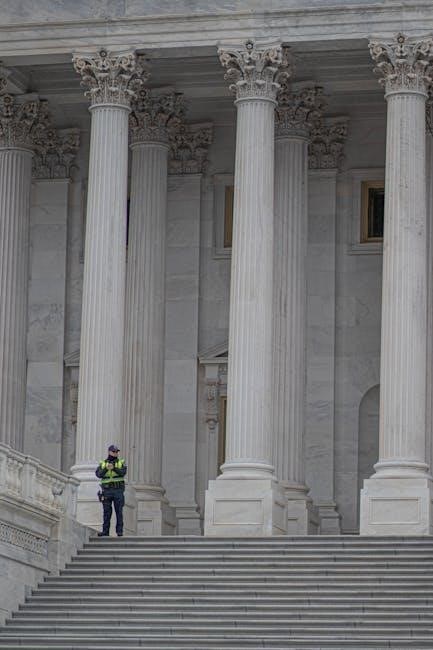
justice by sandel pdf
Michael Sandel’s Justice: What’s the Right Thing to Do? explores moral reasoning and ethical dilemmas, offering insights into justice theories from Kant, Mill, and Rawls, while engaging readers in contemporary political philosophy.
Overview of Michael Sandel’s Work on Justice
Michael Sandel is a renowned political philosopher and Harvard professor whose work on justice has profoundly shaped contemporary discussions. His book Justice: What’s the Right Thing to Do? and accompanying course have become landmarks in moral and political philosophy. Sandel’s approach combines deep philosophical inquiry with real-world examples, making complex ideas accessible to a broad audience. He critiques libertarianism and explores theories from Kant, Mill, and Rawls, while advocating for an Aristotelian perspective on justice. Sandel’s engaging teaching style and ability to connect philosophy to everyday life have made his work widely influential, sparking global conversations about morality, rights, and the common good.
The Relevance of “Justice: What’s the Right Thing to Do?”
Justice: What’s the Right Thing to Do? by Michael Sandel is a highly influential work that bridges philosophy and everyday life. Sandel’s ability to present complex ethical ideas in a clear, engaging manner has made the book a cornerstone of modern political philosophy. It challenges readers to think critically about morality, rights, and the common good, offering insights into contemporary issues. The book’s relevance lies in its accessibility and its ability to spark global conversations about justice, making it a vital resource for understanding ethical dilemmas in both personal and societal contexts. Sandel’s work continues to inspire dialogue, emphasizing the importance of moral reasoning in shaping a just society.

Key Themes in “Justice by Sandel PDF”
Moral reasoning, ethical dilemmas, and philosophical theories are central to Sandel’s exploration. He examines Kantian, utilitarian, and Rawlsian perspectives, while critiquing libertarianism and liberalism, emphasizing the balance between individual rights and societal well-being.
Moral Reasoning and Ethical Dilemmas
Moral reasoning lies at the heart of Sandel’s exploration, as he guides readers through complex ethical dilemmas. By examining real-life scenarios, Sandel challenges individuals to question their assumptions about right and wrong. His approach emphasizes the importance of active engagement with moral philosophy, rather than passive acceptance of societal norms. Sandel’s discussions often revolve around questions like, “When is it justifiable to lie?” or “How do individual rights balance against the greater good?” These inquiries encourage readers to think critically about justice in everyday life. Sandel’s Harvard course, “Justice,” famously engages students in debates over these dilemmas, demonstrating how moral reasoning is both a personal and societal endeavor.
The Role of Philosophy in Understanding Justice
Philosophy plays a central role in Sandel’s exploration of justice, as he delves into the works of influential thinkers like Kant, Mill, and Rawls. By analyzing their theories, Sandel provides a framework for understanding justice beyond mere opinion or tradition. His approach highlights how philosophical inquiry can illuminate the moral and ethical dimensions of justice, encouraging readers to think deeply about its meaning. Sandel’s use of real-world examples bridges the gap between abstract philosophy and practical application, demonstrating how philosophical thought remains essential for addressing contemporary issues. This integration of philosophy and real-life scenarios underscores the enduring relevance of philosophical reasoning in shaping our understanding of justice.
Exploration of Theories from Kant, Mill, and Rawls
Michael Sandel examines the foundational theories of justice proposed by Kant, Mill, and Rawls, offering a comprehensive analysis of their philosophical contributions. Kant’s deontological approach emphasizes moral duties and universal rules, while Mill’s utilitarianism focuses on maximizing overall happiness. Rawls’ theory of justice as fairness introduces the concept of the original position, where principles of justice are chosen behind a veil of ignorance. Sandel critiques and builds upon these theories, highlighting their strengths and limitations. By engaging with these thinkers, Sandel provides a deeper understanding of justice, encouraging readers to evaluate how these philosophical frameworks apply to contemporary ethical dilemmas and societal challenges.

Philosophical Foundations of Justice
Philosophical foundations of justice are explored through the works of Kant, Mill, Rawls, and Sandel’s Aristotelian perspective, shaping moral, political, and ethical reasoning.
Kant’s Moral Philosophy and Its Impact on Justice
Immanuel Kant’s moral philosophy, as discussed in Sandel’s work, emphasizes the Categorical Imperative, asserting that actions are morally right if they conform to universal moral laws. Kant’s deontological approach prioritizes duties and rights over outcomes, shaping justice as a system of moral rules. Sandel critiques Kant’s rigidity, arguing that moral reasoning must consider context and human flourishing. Kant’s influence on justice is profound, grounding it in reason and dignity, yet Sandel suggests balancing these principles with ethical flexibility. This tension between Kantian universalism and situational ethics remains central to contemporary debates on justice.
Mill’s Utilitarian Approach to Justice
John Stuart Mill’s utilitarian philosophy, as explored by Sandel, posits that justice is achieved by maximizing overall happiness and minimizing suffering. Mill argues that actions are morally right if they promote the greatest good for the greatest number. Sandel highlights how Mill’s approach emphasizes consequences over duties, contrasting with Kant’s deontological ethics. While Mill’s theory offers a pragmatic framework for resolving ethical dilemmas, Sandel critiques its potential to overlook individual rights and moral complexities. Mill’s influence on justice lies in balancing collective well-being with individual freedoms, though Sandel challenges the notion that quantifying happiness can fully capture the nuances of moral decision-making.
Rawls’ Theory of Justice as Fairness
John Rawls’ Theory of Justice as Fairness, discussed by Sandel, introduces the concept of the “original position,” where individuals behind a “veil of ignorance” establish principles of justice without knowing their personal circumstances. Rawls advocates for two principles: equal basic liberties and the difference principle, allowing inequalities only if they benefit the least advantaged. Sandel examines Rawls’ emphasis on fairness and equality, contrasting it with utilitarianism, which prioritizes overall happiness. Sandel highlights how Rawls’ contractualist approach ensures justice is rooted in reason and mutual agreement, addressing the balance between individual rights and social good. This theory remains central to contemporary debates on justice and equality, offering a framework for evaluating societal structures and policies.
Sandel’s Aristotelian Perspective on Justice
Michael Sandel’s Aristotelian perspective on justice emphasizes the importance of virtue and the common good. Drawing on Aristotle’s ethical framework, Sandel argues that justice cannot be reduced to abstract principles like utility or fairness alone. He contends that a just society must cultivate virtues that enable individuals to flourish and contribute to the community. Sandel critiques modern theories, such as liberalism, for neglecting the moral and civic dimensions of justice. By revisiting Aristotle’s ideas, Sandel advocates for a more holistic understanding of justice, one that balances individual rights with the collective pursuit of human flourishing. This approach challenges readers to rethink justice in light of ancient wisdom and its relevance to contemporary ethical dilemmas.

Major Concepts Discussed in the Book
Michael Sandel’s Justice: What’s the Right Thing to Do? explores theories of justice from Kant, Mill, and Rawls, critiques libertarianism, and examines tensions between individual rights and societal welfare;
Libertarianism and Its Critique by Sandel
Michael Sandel critiques libertarianism, arguing that it prioritizes individual freedom over moral responsibility. He challenges the idea that personal liberty should trump all ethical considerations, emphasizing the importance of community and collective well-being. Sandel uses real-world examples, such as the moral obligation to help a drowning child, to illustrate the limitations of libertarian thought. His approach questions whether freedom alone can define justice, advocating instead for a balance between individual rights and societal needs. This critique aligns with his broader exploration of justice theories, encouraging readers to think critically about the role of morality in shaping societal norms and legal frameworks.
Liberalism and the Limits of Justice
Michael Sandel examines the limitations of liberalism in addressing justice, arguing that its focus on individual rights and freedoms often neglects the common good. He critiques liberalism’s tendency to prioritize procedural justice over substantive moral values, leading to a society where markets and individual choices dominate ethical discourse. Sandel contends that liberalism’s emphasis on neutrality fails to provide a robust framework for resolving moral disputes, particularly when competing rights and interests are at play. He advocates for a more engaged form of liberalism that incorporates moral reasoning and acknowledges the role of community in shaping justice, urging a balance between individual rights and societal well-being.
The Tension Between Individual Rights and Social Good
Michael Sandel highlights the tension between individual rights and the social good, arguing that a sole focus on individual freedoms can undermine collective well-being. He critiques the notion that individual rights are absolute, emphasizing that justice often requires balancing personal liberties with societal needs. Sandel uses examples like affirmative action and property rights to illustrate how individual claims may conflict with the broader public interest. He advocates for a moral framework that considers both individual rights and the common good, urging a nuanced approach to resolve such dilemmas. This tension, Sandel argues, is central to understanding justice in modern societies.

Real-World Applications of Sandel’s Ideas
Michael Sandel’s ideas are applied to contemporary political and social issues, offering practical insights into justice, morality, and fairness in real-world contexts and global challenges.
Justice in Contemporary Political and Social Issues
Michael Sandel’s work addresses pressing modern issues, such as economic inequality, human rights, and social justice. His ideas help bridge moral philosophy and real-world challenges, offering frameworks to analyze debates on fairness, rights, and equality in society. By engaging with topics like affirmative action, same-sex marriage, and market-driven ethics, Sandel encourages critical thinking about justice in everyday life. His approach highlights the importance of ethical reasoning in navigating complex political and social dilemmas, making his insights highly relevant to contemporary discussions on fairness and morality in global contexts.
Examples of Moral Dilemmas in Everyday Life
Michael Sandel’s work explores how moral dilemmas arise in ordinary situations, such as lying to protect someone’s feelings or deciding whether to buy products made in exploitative conditions. He examines everyday ethical choices, like whether it’s fair to prioritize personal gain over societal well-being. Sandel uses relatable scenarios to illustrate how principles of justice apply to real-life decisions, encouraging readers to think critically about morality in action. These examples highlight how justice is not just a philosophical concept but a practical guide for navigating the complexities of human behavior and decision-making in everyday life.
The Role of Justice in Global Politics and Economy
Michael Sandel’s exploration of justice extends to global politics and economics, where he critiques systems that prioritize profit over fairness. He argues that economic inequality and exploitation often result from a lack of moral reasoning in policy-making. Sandel questions whether global markets can truly be just if they disproportionately benefit wealthy nations while marginalizing others. His Aristotelian perspective emphasizes the need for ethical considerations in international trade and diplomacy. Sandel’s ideas challenge leaders to rethink justice on a global scale, advocating for policies that respect human dignity and promote equality worldwide. His insights are vital for addressing contemporary issues like economic disparities and human rights in a globalized world.

Michael Sandel’s Teaching and Influence
Michael Sandel’s Harvard course on justice is one of the most popular, engaging students in moral and political philosophy through real-world dilemmas and ethical debates;
Harvard’s Popular Course on Justice
Michael Sandel’s Harvard course on justice is one of the university’s most popular and influential offerings. It engages students in exploring moral and political philosophy through real-world dilemmas. The course challenges participants to think critically about justice, equality, and freedom, using examples from contemporary issues. Sandel’s teaching style, which emphasizes interactive debates and ethical reasoning, has made the course accessible and compelling to a broad audience. Its global reach has been extended through online platforms, allowing millions worldwide to engage with Sandel’s insights. The course’s success reflects Sandel’s ability to bridge academic philosophy with everyday concerns, fostering a deeper understanding of justice in society.
Engaging Students in Moral and Political Philosophy
Michael Sandel’s approach to teaching justice emphasizes active engagement, encouraging students to question their assumptions about morality and politics. He uses thought-provoking examples and real-world dilemmas to illustrate complex philosophical concepts, making them relatable and accessible. Sandel’s method fosters critical thinking and dialogue, as students are urged to articulate and defend their views. His ability to connect abstract theories to everyday issues has made his course a transformative experience for many. By challenging students to think deeply about justice, Sandel not only educates but also inspires them to apply philosophical ideas to their lives and society at large.

Critical Reception and Impact
Michael Sandel’s Justice: What’s the Right Thing to Do? has received widespread acclaim for its clarity and depth, influencing public discourse and academic debates alike.
Reviews and Critiques of “Justice: What’s the Right Thing to Do?”
Michael Sandel’s Justice: What’s the Right Thing to Do? has garnered significant attention for its accessible exploration of complex moral and political themes. Critics praise Sandel’s ability to engage readers with real-world examples, making philosophy relatable. The book is commended for its clarity and depth, particularly in its examination of theories from Kant, Mill, and Rawls. However, some scholars argue that Sandel’s Aristotelian perspective oversimplifies certain philosophical debates. Despite these critiques, the work remains influential, sparking meaningful discussions on justice, individual rights, and societal norms. Its impact extends beyond academia, shaping public discourse on ethics and democracy.
Sandel’s Contribution to Modern Political Philosophy
Michael Sandel has significantly influenced modern political philosophy by bridging academia and public discourse. His work challenges dominant ideologies, such as libertarianism, emphasizing the importance of community and moral values. Sandel’s ability to engage diverse audiences has made complex philosophical concepts accessible, fostering a broader understanding of justice. His critiques of utilitarianism and Rawls’ theories of justice have sparked debates, while his Aristotelian perspective offers a fresh lens for addressing contemporary ethical dilemmas. Sandel’s impact extends globally, shaping discussions on democracy, equality, and individual rights. His Harvard course and writings have inspired new generations to think critically about justice, solidifying his role as a leading voice in political philosophy.
Michael Sandel’s work on justice remains a cornerstone of modern ethical discourse, inspiring reflection on morality and its role in shaping society.
The Lasting Legacy of Sandel’s Work on Justice
Michael Sandel’s work on justice has left an enduring impact on political philosophy and ethical discourse. His ability to engage audiences globally, through his Harvard course and writings, has made complex ideas accessible. By challenging libertarian and liberal frameworks, Sandel’s Aristotelian perspective has sparked debates on morality and equality. His emphasis on moral reasoning has inspired students and scholars to rethink justice in personal and societal contexts. Sandel’s critiques of modern ideologies continue to shape discussions in academia and public life, ensuring his work remains a vital resource for understanding justice in contemporary times. His legacy lies in fostering a deeper appreciation for ethical inquiry and its relevance to global challenges.
Final Thoughts on the Importance of Moral Reasoning
Moral reasoning, as emphasized by Michael Sandel, is essential for navigating complex ethical dilemmas in personal and societal contexts. By engaging with philosophers like Kant, Mill, and Rawls, Sandel encourages readers to think critically about justice and morality. His work underscores the importance of moving beyond superficial judgments to deeper reflections on what is right and fair. Sandel’s approach fosters empathy, dialogue, and a commitment to ethical inquiry, which are vital in addressing global challenges. Ultimately, his teachings remind us that moral reasoning is not just an intellectual exercise but a necessary tool for creating a more just and compassionate world.